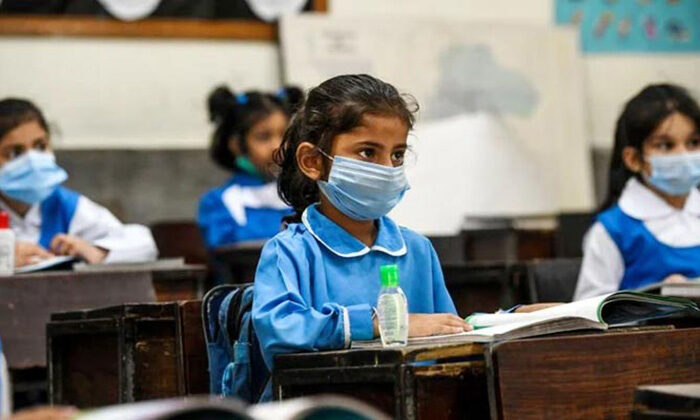
Students wear protective masks maintaining safe distance as they attend a class. — AFP/File
Concern has been raised by Christian organisations following Pakistan’s decision to implement a new national curriculum that will Islamize the education system through an emphasis on the Quran and Islamic teaching.
According to International Christian Concern (ICC), an interdenominational human rights organization dedicated to assisting Christians throughout the world, the changes will only strengthen radicals to oppress Christians, among other minority groups in the nation.
Fronted by the nation’s Prime Minister Imran Khan, Deutsche Welle (DW) reported Monday the first phase of implementing the new curriculum involves primary school students in the first through fifth grades.
“The plan mandates the students to read the entire Quran with translation, learn Islamic prayers and memorize a number of hadith (words, actions and approval of the Prophet Muhammad),” the German public state-owned international broadcaster reported.
The new curriculum also stipulates that every school and college must employ a pair of certified Hafiz (a person who has memorized the Quran) and Qari (a Quran reciter) to teach these subjects.
Moving on, the government will in its second phase introduce the new Islam-heavy syllabus for middle school students and possibly for high school students in the 11th and 12th grades.
According to DW, critics generally believe that the move will “increase the influence of Islamic clerics, sharpen sectarian fault lines and greatly damage the social fabric.”
“Current Pakistani curriculum already contains bigoted and hateful material and makes derogatory references to various religious minority communities in Pakistan,” ICC warned.
Urdu, English and social studies have been heavily Islamized, Abdul Hameed Nayyar, an Islamabad-based academic, told DW. He added that students will also study the Quran’s 30 chapters and a translation of the entire book at a later stage, besides the book on Islamic studies.
Nayyar explained to DW that critical thinking was a basic tenet of modern knowledge but the government seemed to be promoting ideas that are antithetical to this through the syllabus.
Lahore-based educationist, Mr Rubina Saigol explaine during his interview with DW that “the syllabus is likely to produce students with an Islamic conservative global outlook, who would view women as subservient souls who do not deserve freedom and independence.”
The Islamization of curricula has not been limited to schools, according to sources. Recently, the government in Punjab province also made teaching of the Quran with translation mandatory for all university students.
According to the provincial government, DW writes, students will not be awarded degrees if they do not study the Quran.
What officials say
Speaking to media, one parliamentarian from the ruling party, Mr Muhammad Bashir Khan, said the Islamization of the syllabus “is the right step.”
“Pakistan is an ideological Islamic state and we need religious education,” he was quoted as saying. “I feel that even now our syllabus is not completely Islamized and we need to do more Islamization of the syllabus, teaching more religious content for the moral and ideological training of our citizens.”

